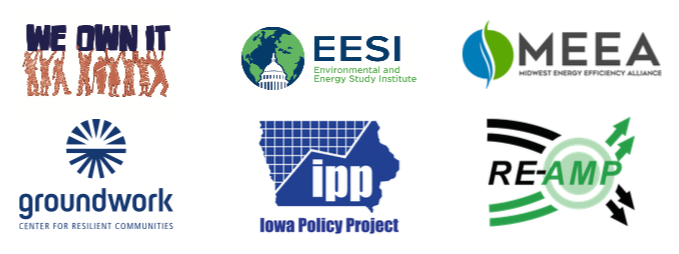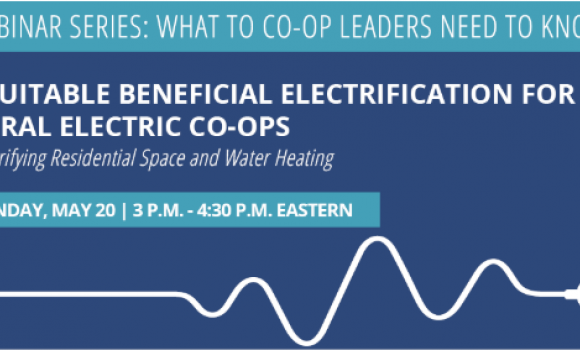
This is a collaborative report by a REAMP action team including: We Own It, Energy & Environmental Study Institute, Iowa Policy Project, Midwest Energy Efficiency Alliance, and Groundwork Center that investigates equitable beneficial electrification programs at electric co-ops focusing on those in the Midwest. It was published in May 2019.
Download the full report here or just the report cover with the executive summary here or click on the icons in the left sidebar to download.

Here's an excerpt from the Executive Summary:
"This report focuses on equitable beneficial electrification as a pathway for rural electric cooperatives to decarbonize their power grid. Particularly, this report examines how Midwest rural co-ops incentivize members to switch from fossil fuel–powered end-use equipment to electric end-use equipment. About 5 million homes in the rural Midwest—mostly served by co-ops—power their space-heat- ing and water-heating equipment predominately with propane.
The lens in which the authors are viewing this research and information is based on the ReAMP Networks’ Equitable Deep-Decarbonization Framework which states, “Include everyone, electrify everything, and decarbonize electricity.”
To address equity, we examine some of the barriers that have led to historic inequity in distribution of energy efficiency program funds, evaluate equity of existing beneficial electrification and efficiency programs, and discuss opportunities to address equity in future program design and implementation.
Rural electric cooperatives have been energy innovators and leaders since their formation around eighty years ago. Today, about 900 co-ops nationwide provide power to 13 percent of all Americans and 56 percent of the US landmass. In the Midwest, 300 co-ops serve power to about 3.7 million members across 12 states.
As nonprofits owned by their members, co-ops are guided by seven cooperative principles, which are: voluntary and open member- ship; democratic member control; member economic participation; autonomy and independence; education, training and information; cooperation between cooperatives; and concern for community. Electric Cooperatives also have a commitment to serve their members by providing safe, low-cost, and reliable power. One way to better serve their members is for co-ops to offer incentives for beneficial electrification programs.
Beneficial electrification (aka Strategic Electrification) refers to switching fossil-fuel end-use equipment to electric equipment in a way that reduces overall carbon emissions, while providing benefits to the environment and to members. In buildings, this means replacing older and inefficient gas or propane-powered furnaces and water heaters with more efficient, electric space and water heat pump technology. It could also include incentives to electrify vehicles, for example, incentives to finance electric charging stations or electric school buses. Specifically, the report focuses on the replacement of fossil fuel–powered space and water heating with air- source heat pumps or water heaters in residential buildings.
In 2018, the National Rural Electric Cooperative Association (NRECA), an organization providing resources to all 900 co-ops, unanimously approved a resolution supporting beneficial electrification programs. This resolution indicates that the national association is putting all its resources behind beneficial electrification and that co-ops should start to consider such actions and programs as part of the services they provide to their membership. This report provides a landscape view of current residential energy efficiency, energy equipment programs, and space- and water-heating beneficial electrification programs run by Midwest co-ops for their members."
Download the full report here or just the report cover with the executive summary here or click on the icons in the left sidebar to download.

